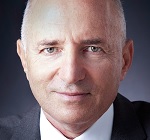 |
| Teva's Michael Hayden |
An FDA advisory panel has handed Teva ($TEVA) a ringing endorsement for its IL-5 asthma drug reslizumab, offering a unanimous recommendation for marketing approval. That recommendation should quickly put it in direct rivalry with GlaxoSmithKline ($GSK), with AstraZeneca ($AZN) as well as Regeneron ($REGN) following up to compete for command of a new wrinkle in the multibillion-dollar asthma field.
But there was a big hitch for Teva. The advisers only gave a green light for patients who are 18 or older, turning their thumbs down unanimously against approval for 12 -to 17-year-olds. The sample size in Teva's study was too small to convince the panel that investigators had provided convincing evidence of efficacy and safety in that niche. Two safety issues--for anaphylaxis and muscle toxicity--were also flagged.
The advisers noted that there is still a major part of the patient population with severe asthma marked by an eosinophilic subtype who don't respond adequately to currently available drugs.
As Bernstein's Ronny Gal noted to investors, the panel's rejection poses a major challenge to Teva once it hits the market, as he expects it will, for adults only. GlaxoSmithKline's recent approval for Nucala (mepolizumab) is for 12 and over, giving the pharma giant a distinct advantage in any final marketing showdown.
"Not having a label for the entire asthma population will have certain commercial implications when there is a competitor (GSK's Nucala) approved for a broader label," writes Gal. "(i) Payors will need to include more than one anti IL5 product on formulary to address the total asthma population. Based on the tightening formulary restrictions in the respiratory market, it appears they prefer to move to one agent. (ii) Detailing by sales reps against Reslizumab will become much easier, as reps would rally behind a 'one drug meets all' approach and point to AdCom concerns around infusion ("doc, do you really want to take on the anaphylaxis risk?"). (iii) Reslizumab was already at disadvantage due to IV administration vs. Nucala's SC method of administration."
As a result, Gal cut his peak sales estimate for the drug from $400 million to $200 million.
Further complicating the field is AstraZeneca's benralizumab, another IL-5 asthma drug that AstraZeneca says could garner blockbuster revenue if it comes through in Phase III. Regeneron and its close partner Sanofi are coming through Phase III with dupilumab, an IL-4/IL-13 contender which some analysts believe can earn $2.5 billion for eczema and asthma.
GlaxoSmithKline gets the first shot at the market, but the prospect of near-term competition may also blunt its ability to gain market share. GSK's respiratory group has struggled in recent years, with new products falling far short of expectations as its flagship product Advair faces generic competition.
Teva, which has struggled on the R&D side, is looking at the upside today.
"We are very encouraged by the outcome of today's FDA Advisory Committee meeting, which brings us one step closer to potentially providing a new, targeted treatment option for a specific group of patients with inadequately controlled asthma and evidence of ongoing eosinophilic inflammation," says Michael Hayden, the chief scientific officer at Teva.
- here's the release from Teva